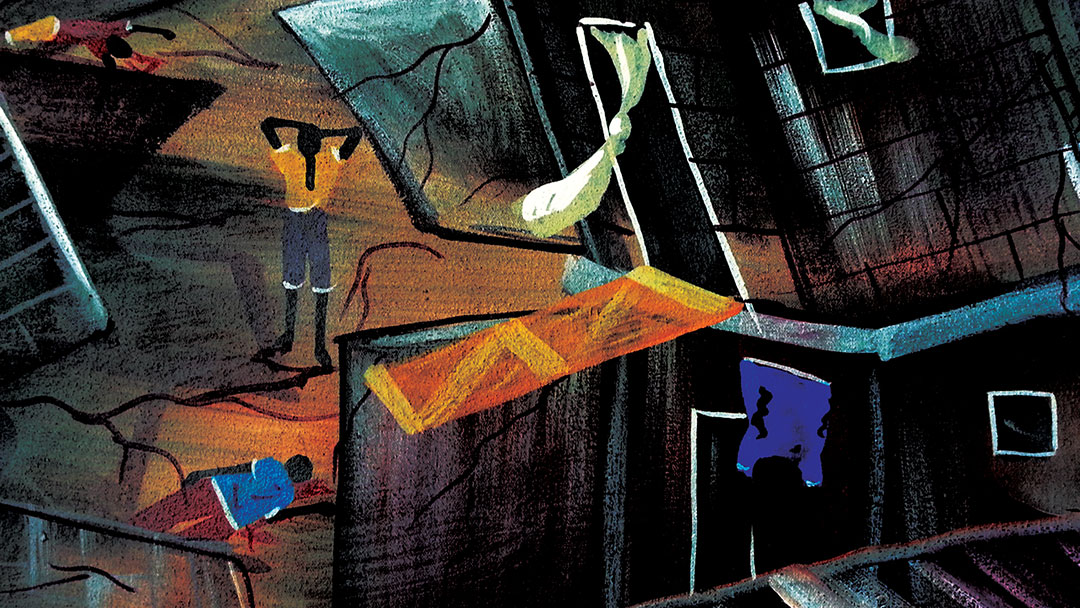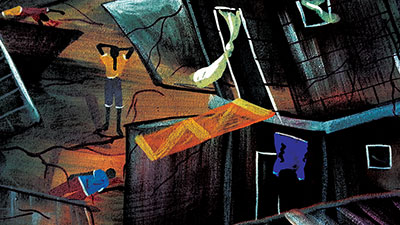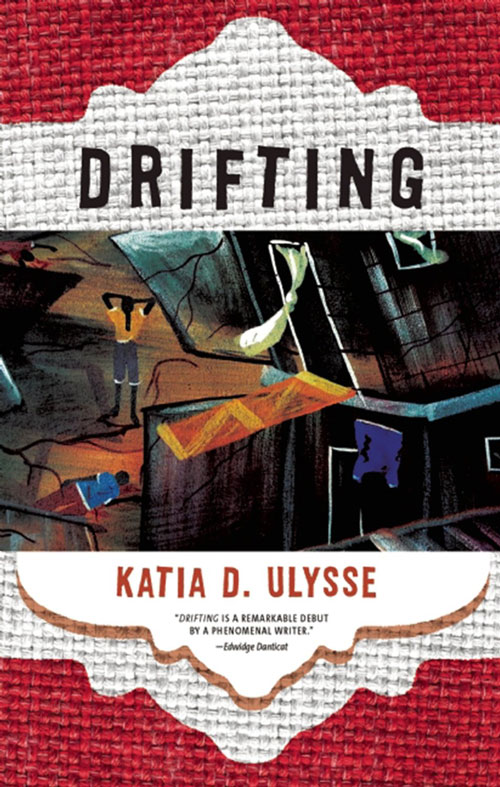


It was a blustery dawn when we began our four-hour plane ride to Port-au-Prince. The plane burst with college-aged sets in matching Pray for Haiti Now! and Save Haiti Today! T-shirts. They boasted about their plans for saving the so-called poorest nation in the Western hemisphere. They congratulated one another on their novel ideas. They would do what Haitians could not do for themselves. They would Tweet and post proof of their hard work on social networking sites. I put my head on Serge’s shoulder and forced myself to sleep.
When we reached Freda’s place it was not yet noon. “It takes more time to get to LA from our house,” Serge quipped. “We should come to Haiti at least once a week.” His eyes sparkled. The subtle film of perspiration on his face made him glow.
Freda had bought a lavish meal of fried plantains, fish, and rice for us. Serge and I ate as if we had not seen food in months. Freda, of course, could not join us at the table. There were two children in her care. She dared not leave them.
“You’re a saint,” Serge told Freda.
“Anybody could do what I do,” Freda replied, bowing her head. The utilitarian dress hanging from her thin frame betrayed no curves. Her hair was cropped like a soldier’s. “Go enjoy the Caribbean sun,” she instructed us. She would not leave the children for a moment. They were, after all, the ones she had meant to have someday — if only there had been time.
Serge and I went outside to sit on the washerwoman’s heap of rocks. All around us, concrete-block dwellings were stacked like dominoes with dots for windows and dots for doors. The calabash groves were but a memory.
“Honè,” said a woman trudging up to Freda’s place with a child in her arms. Sweat dripped off the face of a boy inching behind her.
Serge and I rose from our pile of rocks to greet them.
“Doktè a la?” the woman asked in one quick breath. The child in her arms coughed violently; the rusty eyes offered an apology.
“The doctor is here,” I replied in Creole, and called Freda.
With outstretched arms, Freda rushed to greet her visitors. “Bonjou,” she spoke quickly. She needed to return to the children inside the clinic.
“My baby caught the illness,” the woman declared. Tears pooled in her eyes. “This illness put my husband under the ground last month.” The child in her arms convulsed, as if to underscore the woman’s words.
“Give her to me,” Freda said, taking the baby. The woman followed Freda into the clinic.
“I’m going with them,” I told Serge, and followed the women.
“What’s her name?” Freda asked, as she placed the child in a worn crib.
“Dieudonne,” the woman said.
Something inside me leapt.
“And you, madame? What is your name?” Freda asked. “Lidia.”
What did names matter at this time?
Freda wiped her brow. “Hot day, yes?”
“Yes,” Lidia replied, eyes narrowing. “This is Haiti. All the days are hot.”
Freda would not tell Lidia that she did not like to be rushed. She would do everything she could to save Dieudonne’s barely used life. “Dieudonne means God gives,” Freda added.
“Is that so?” Lidia and I chorused in unison.
Freda listened with her stethoscope to the story that Dieudonne’s lungs were dying to tell.
“Go play outside,” Lidia said to the lanky boy clinging to her skirt. “Wait for me there.”
“I stay with you,” the boy bleated.
“Do it.” Lidia wagged her finger.
The boy did not budge. I took his hands, and said: “Come with me.”
“Take him to your lounge chair under the sun,” Freda suggested with a forced smile. “This is your island getaway, remember?”
I led the boy to the washerwoman’s heap of rocks. Serge was now talking to a passerby a few feet away. The boy and I sat in silence for a time. When I asked his name, he said: “Everyone calls me Ti Papa. I don’t like it, but I accept it.” His were bold, unblinking eyes.
“Why do they call you that?”
“I look like my father, but I don’t want to die like him.”
“You won’t die,” I said.
Ti Papa shrugged, then asked: “Why didn’t you want to stay inside?”
“I’m not a doctor.”
“You have a soft heart,” Ti Papa said. “You can’t have a soft heart if you’re here to save lives. Sometimes you have to break a bone to save the rest of the body. You cannot have a soft heart if you have to break bones.” The boy’s eyes stayed fixed on the domino dwellings in the distance, searching for some unknown thing. He was a wise old man trapped in a child’s body.
“The doctor made me leave,” Lidia explained contritely when she joined us on the rocks moments later. “It won’t help Dieudonne to see me sad.”
Ti Papa once again became withdrawn, childlike, and clung to his mother’s skirt.
“If anyone can take care of Dieudonne, it’s Freda,” I told Lidia, hoping this was not another wish that would not come true.
“So they say,” Lidia replied. “Children deserve a better life.” She gestured at the concrete dwellings around us and sighed heavily. “I want to give my children a decent life, but I don’t see how. A good future is not possible in this country. I would give my two arms to find a better way.”
As Lidia opened her mouth to speak again, the washer-woman’s heap of rocks shook so forcefully we jumped to our feet and stared at the ground in disbelief. Shock registered in Ti Papa’s eyes as the rocks bounced on the arid soil and rolled around like marbles. Lidia peered about for a clue of what was happening. The ground under our feet looked like a stormy sky. It grumbled like thunder, and cracked like lightning. Water gushed out from sudden fissures in the desertlike soil. Earth and sky had been inverted, and Paradise was lost. The angry earth lifted and then dropped us with a vengeance. A piercing scream ripped through Lidia’s throat as she reached for Ti Papa, but something under the ground pushed the boy even further away. Serge ran toward me, screaming something but I could not hear because the domino houses were now crumbling like stale cake, one on top of the other on top of the other, sending explosions of dust skyward.
All around us, the dwellings continued to fall. There was thick dust in my eyes, dust in my mouth. There was a dust storm in the spot where Freda’s clinic had been only moments before.
I screamed for my sister. Lidia screamed for Dieudonne. I realized then that I had never learned the other two children’s names. Ti Papa held his mother’s skirt and shook violently. The parched terrain underneath us shook even more violently.
“Dear God,” Serge shrieked as he made his way to the mound of concrete blocks that had been Freda’s clinic. “Dear God,” he repeated as he began to remove cement blocks and toss them aside. He would not stop until he rescued Freda and the babies she had meant to have — if only there’d been time.
Come on in, dear. Sit down. Would you like some coffee? Hey, how often does the boss ask if you’d like something to drink? Times are changing, aren’t they? Some say the world is coming to an end. I hope they’re wrong. By the way, has everyone in your family been accounted for? Never mind that question. You must be getting sick of hearing it. People must ask you that all the time. Has everyone in your family been accounted for? That is an odd question. After all, it’s been weeks since the quake struck. I hope you don’t hold it against me for asking you this now. I’ve been busy with life. You know how it is.
I hear communication is still pretty bad between here and there; hear it’s tough getting through. Have you been able to reach your people? From what I understand communication was pretty below standard even before this thing happened. I’m guessing you don’t know much of anything. Who would? Come to think of it, you may never know if all your family is accounted for. Dear God!
Listen, dear, I understand. I really do. I’ve even had a nightmare or two. If I were in your shoes, I don’t know what I would do. I can’t even begin to wrap my brain around some of the images I’ve seen on CNN. I can’t imagine what your people must be going through. The scope of this mess is like nothing the world has ever seen. Dead bodies in wheelbarrows. Dead bodies being shoveled into mass graves. Blood everywhere. Dust and blood. No one has a name. No one is accounted for, right?
This sort of thing must never happen on US soil. I’ve got kids, you know: a boy and a girl, plus one on the way. Can you imagine? I don’t know what I would do if something like that happened here.
Even our military guys down in your country are having a difficult time. And some of those guys have done tours in Iraq, Afghanistan. They say your country has the desert beat by a thousand miles. I read somewhere that the soldiers now have trouble sleeping. They can’t keep food down. They’re going to need serious assistance after this quake thing blows over. War, you know, is different. You expect to see certain things on the battlefield. You expect to hear certain noises, cries. You expect to smell certain smells. You expect to see death. A lot of it, in fact. But this is not war.
My heart goes out to you, dear. And to your family. Believe me when I tell you that. My heart goes out to your country too. I’d never heard so much about that place in my entire life before the quake hit.
You know, I became so interested and curious that I started to do a little research myself. I had no idea you guys were the first black republic. 1804, right? That’s pretty impressive. I saw something about the maroon people: slaves so clever no one could catch them. It was cool the way they hid in those hills. I’ll have to go back and read a little more about them. I like to know about that sort of thing.
I found out your country used to be gorgeous too. Imagine that! It was the place to be once upon a time, am I right? They called it the Pearl, or something like that. That sounds so resort-like, you know: Come on down to the Pearl. Lose your shoes and your troubles. Have a cocktail with one of those little umbrellas in them. Somebody told me Elizabeth Taylor and other movie stars used to vacation down there. I hear Bill and Hillary Clinton honeymooned down there. Who knew Haiti was a place to have a honeymoon?
Hey, can you believe your country is next to the Dominican Republic? It’s like one of those masks you see in the theater: comedy and tragedy, right? I’ve taken my family to the DR several times. Nice place. Amazing beaches. Good food! You’d never know your country was right next door.
Yes ... of course ... forgive me ... Here I am going on and on, telling you what you probably already know. Believe me when I tell you I really, truly do feel your pain. I can almost put myself in your shoes. So, let’s get back to your question about bereavement pay.
Yes. If you consult the employee manual, you’ll see how bereavement is broken down according to proximity. Your mind might be all jumbled up right now with all that you must be going through. Mine would be too. So let me help you find the information you need:
If you lose a mother or a father, that’s an automatic five days off. With pay. If you lose a sister or a brother, three days, also with pay. Grandparents: two days (but you only get paid for one). First cousins: one day, without pay. An uncle or an aunt — depending on how close you were to them, half a day (and we’ll need proof, of course ... you know ... something to show you were actually at a memorial service ... you understand ... oh ... wait ... in your case ... given the circumstances ... well, how do I put this? ... given what we’ve all seen on TV … you won’t be required to provide that sort of proof).
Back to the list. Yes ... second cousins. Let’s see. No ... they’re not on the list. You would not be allowed time off per se, but there’s always your lunch hour. At any rate, you can see, second cousins are not on the list. Your mother-in-law’s brother on her father’s side ... no, also not on the list ... Your cousin’s sister on his mother’s side ... nope, sorry ...The lady who took care of you for ten years while your parents immigrated to another country to work and send money so you could eat and go to school ... sorry, not on the list either ... The lady’s children? Come on, are you kidding me?

Katia D. Ulysse’s debut provides the rare opportunity to peer into the private lives of four secretive Haitian families. The interwoven narrative spans four decades — from 1970 through 2010 — and drifts among various provinces in Haiti, the United States, churches, vodun temples, schools, strip clubs, and the grave. Ulysse introduces us to a childless Haitian American couple risking it all for a baby to call their own; a Florida-based predatory schoolteacher threatening students with deportation if they expose him; and the unforgettable Monsieur Boursicault, whose chain of funeral parlors makes him the wealthiest man in Haiti. This daring work of fiction is a departure from the standard narrative of political unrest on the island. Ulysse’s characters are everyday people whose hopes for distant success are constantly challenged — but never totally swayed — by the hard realities accompanying the immigrant’s journey.